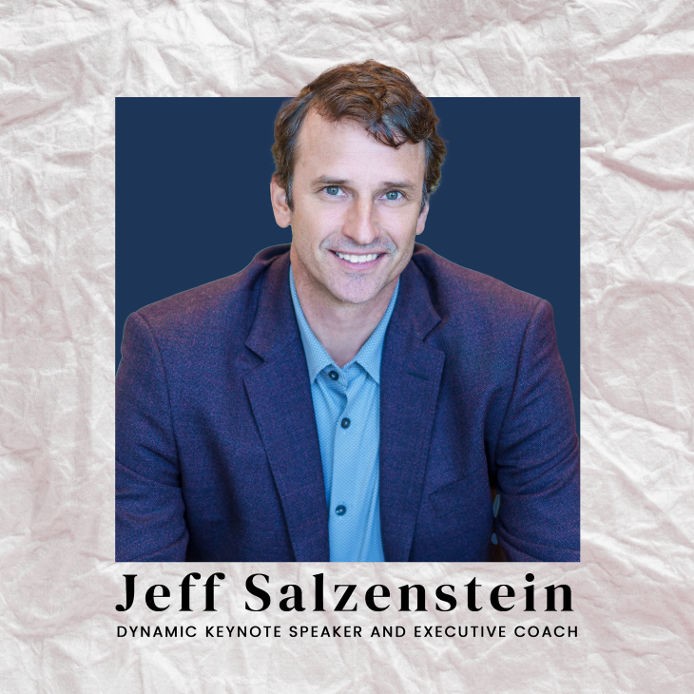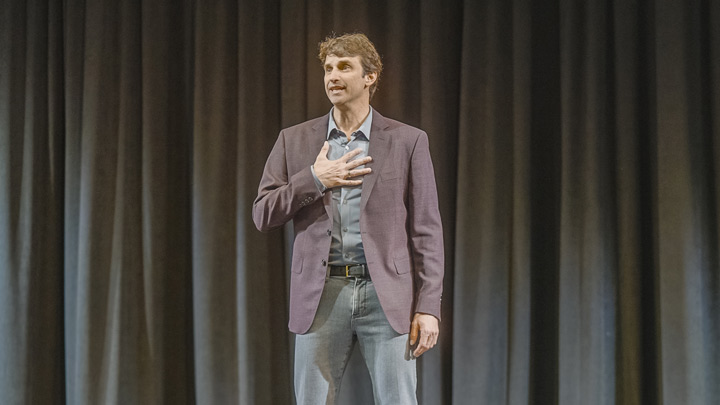CATEGORIES
Entrepreneurial Mindset | Leadership and Networking | People We AdmireOverview:
- Optimize your mind and rid yourself of limiting beliefs in order to achieve your goals and dreams.
- The consistency of repetition contributes to a growth mindset.
- To perform at a high level, you need to tap into the body, mind and soul.
- Healing the parts of ourselves that carry shame, guilt and frustration assists us with breaking free from all barriers that hold us back.
1. How did you become the person you are today?
During the second round of the 1997 US Open, I was up against Michael Chang, who was the world number 2 at the time. This was my first time playing on a big stadium court, with a crowd of 24,000 people in attendance and millions watching on TV. The lead-up to the match made me so anxious. Then I found myself up five games to four in the first set, I even had a set point. I executed a backhand volley that Chang couldn’t reach and hence won the first set. I couldn’t stop smiling, and that moment was the exact moment I lost the match. The dominant thought in my head was, “thank God, I didn’t embarrass yourself.”
I like to share that story because, despite playing incredible tennis, I grappled with the same limiting thinking that affects us all. That began my journey of trying to understand why we have limiting beliefs and why, sometimes, we don’t perform as well as we can.
Now, as a performance coach and speaker, I like to help people optimize their mind and think differently so that they can have stronger beliefs and achieve their goals and dreams.
2. Have you had any mentors that helped you grow both professionally and personally?
Both my parents played tennis and as a result I started playing at three years old, with my father as my coach. I was really good at the sport and won my first trophies as early as eight years old. Additionally, I was named one of the top players in the country at 12 years old. However, there was another side of the coin, as I was very hard on myself and would cry when I lost matches.
Around the age of twelve, my stepfather wrote a poem for me called ‘The Champions Poem’. Here’s the poem: “A champion is a gentleman, he does not whine or complain, he picks himself up when things get tough. He absolutely never quits.
He wins with class, he sometimes loses, but does so with class, a champion stands tall with his head high, he walks proudly and with a purpose, you are a champion.”
I read it every day and ended up winning the national championships 10 months later. After that I went through a period of losing to everyone I previously beat. Critics wrote me off, and my dream of playing at Stanford University seemed like a distant goal.. However, I didn’t stop reading the poem, and coupled it with my ability to bounce back from tough situations. I pushed through, got to the top of the rankings and earned a scholarship to play at Stanford.
Without that poem and mentorship from my stepfather, there’s no way that would have happened. The poem represents a zone of excellence. Looking at mental health challenges today, the idea of brainwashing our minds with uplifting affirmations is missing. We are surrounded by negative messages owing to social media and the news. Reading this poem when you’re down can lift you up and help you make better choices that ultimately result in a better life.
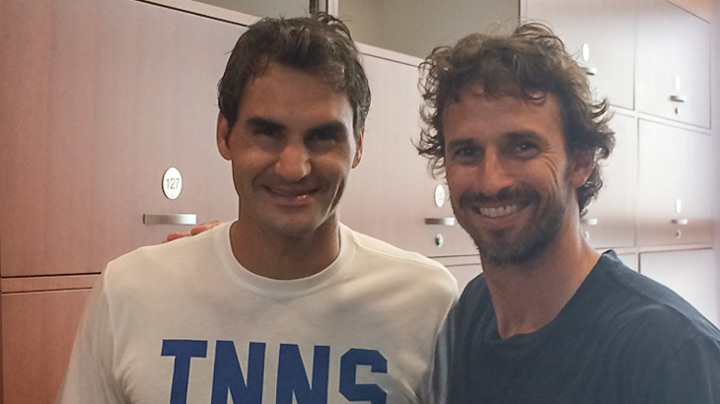
3. What made you decide to enter the corporate industry?
When I entered college, I had one of the worst tennis serves, which Motivated me to transform and add 20 miles per hour. Then my coach put me at the top of the lineup, number one singles at Stanford. I stepped into that leadership role and went on to win two national titles as the team captain. The initial plan was to go to college and then get a corporate job. However, once I managed to transform my serve, I tried pro tennis. The goal was to break the top 100 in the world within three years, and if I couldn’t, then I would go back to the original plan.
My body started breaking down before the age of 25. I had an ankle and knee surgery, which left me thinking I would have to quit tennis. But I decided to bounce back instead, and became obsessed with high performance. I studied the mind, body technique, spirituality, nutrition, human movement, anything and everything around human performance. On pro tours, I used myself as a guinea pig to test all the concepts I was learning and through these learnings, I broke the top 100 in the world at the age of 30.
I share this story because my passion for performance and health led me to enter the corporate industry. As I transitioned out of pro tennis 15 years ago, I started coaching tennis and built an online tennis instruction platform through Youtube. I had accumulated all wealth of knowledge and wisdom from the things I studied for 25 years.
Subsequently, I started performance coaching for athletes, and soon I realized that the same principles apply to people in business. These fundamentals enable individuals to optimize their performance, decrease stress and cultivate resilience. I’m super passionate about helping leaders and organizations become the best version of themselves. It is truly possible to access the zone of excellence if you apply these basic fundamentals.
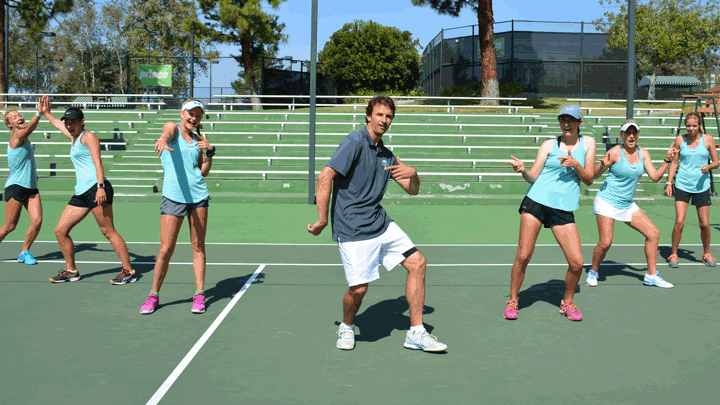
4. Is there a habit that has contributed to building the career that you now enjoy?
In tennis, it’s the consistency of repetition. While improving my serve, I had a growth mindset. I practiced it probably more than anybody. As I transitioned into working with CEO’s, Executive and Leadership teams, I am focusing on the fast paced world we live in. There’s chronic stress, anxiety, burnout, depression, and other mental health challenges. I look at how to apply the basic fundamentals every day to decrease stress and improve performance, productivity, creativity, and health.
I have a framework called the Zone of Excellence, which comprises three foundational principles: Body, Mind, and Soul. To perform at a high level, you need to tap into all three. Most of us have 60,000 thoughts per day and 80% of them are negative. It is essential to be aware of this pattern and start to change it. We have to learn how to get into our body, and actually get into our heart. It is integral to take out time every day to be still and present. It can change your life and change your performance. Practice breathing and meditation, so you can be still, get into your body and decrease that mental chatter.
5. Is there anything you would do differently if you could?
I owe my present self to the amalgamation of all my life experiences, and I wouldn’t alter a thing about my journey. Nevertheless, there’s one element that could have steered my life on a different course: having access to top-notch coaching.
In fact, this is one of the driving forces behind my current role as a coach. I aspire to provide others with the strategies and support they need. Exceptional coaching can be the catalyst for transformative breakthroughs, a resource that I didn’t consistently have at my disposal. Interestingly, it’s the absence of coaching, the pain, setbacks, injuries, and family challenges I encountered along the way that may have contributed to the extent of my personal growth. My pursuit was always to become the best version of myself, and I firmly believe that we should value the instances when things don’t go as planned, as these are often the crucibles of our most significant life growth.
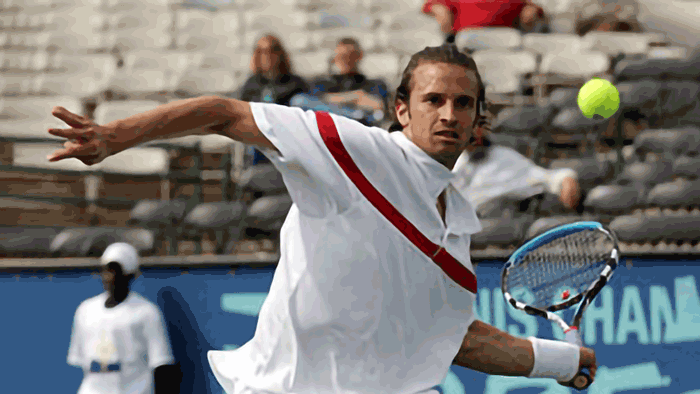
6. What does success mean to you?
It’s not the worldly or material things, It’s being able to perceive every situation as an opportunity to learn and grow. To leverage each experience and become a better version of yourself. That’s when it all comes together and you find a Zone of Excellence, attaining a deeper level of contentment that goes beyond the worldly things.
Outside of that, it is being able to process your feelings. I have worked with men, aged 55 and above, who have made millions of dollars but are still unhappy. You learn resilience, how to recover but not how to feel your feelings. That’s a real challenge that athletes face and why they retire with mental health issues. Without the fulfillment of sharing your experiences and feelings, one will likely feel a sense of emptiness.
7. What is the biggest barrier to high performance outside of chronic stress?
The inability to heal from childhood trauma and adversity. These challenging times that we all go through, whether extreme or not, result from how we perceive them, and have the potential to internalize and store it in our body, mind and soul.
I believe that one of the reasons we’re on this earth is to heal the parts of ourselves that carry shame, guilt and frustration and to break free from all the barriers that hold us back. This is also what I love about Girl Power Talk. You empower women and girls that have been in a place with adversity at a young age to a place where they can be empowered to believe in themselves and take the next step, to self-reflect and become aware of their limiting beliefs. Often, events from our childhood affect us, and then we wonder why we can’t have healthy relationships or get the job we want. We unknowingly sabotage ourselves and think it’s something in the present moment but if we take a deeper look, these patterns trace back to our past.
Healing that part of ourselves is the deeper layer of performance and health.
8. How do you prevent burnout?
I focus on instilling daily fundamental behaviors that are life-giving instead of life-draining. I focus on my sleep, and have an aura ring that helps me measure my sleep every night. I do heart-focused breathing to get into coherence. I also have a coach that helps me with somatic principles of getting into my body. I move my body, go outside, do bodyweight exercises for my physical body, I go to church every Sunday, stay alcohol free, I don’t use any substances, I try to eat a healthy diet. All in all, I basically maintain a healthy lifestyle, including being around healthy people as I truly believe that you are the five people you spend the most time with.
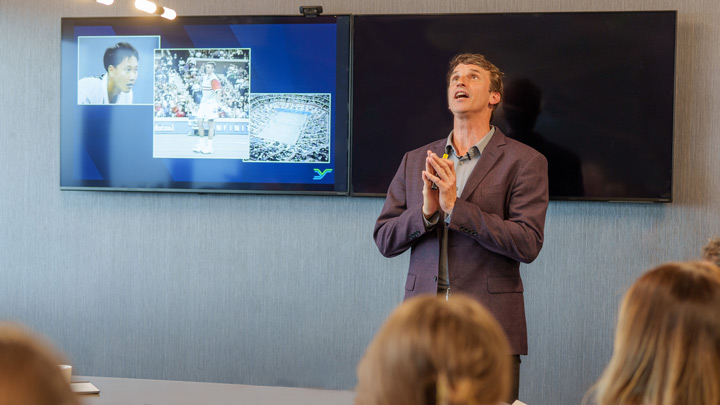
9. Would you suggest young sportsmen & women start with multiple sports or focus on specializing in one?
Both approaches have their advantages and disadvantages. In my case, I participated in multiple sports until I was fourteen years old. While many individuals opt for early specialization, the choice depends on your personal goals and aspirations.
Certain sports, such as track, may not necessitate a high degree of skill and rely more on natural talent. If your ambition is to pursue a professional career in a specific sport, it’s generally advisable to start specializing at a younger age.
However, if you’re seeking a healthier and more enjoyable overall experience, then engaging in multiple sports can be a better option. This approach allows you to establish connections with people involved in various sports, fostering a more well-rounded and social engagement in your athletic pursuits.
10. What is your message for the world?
“It’s never too late to change.”
I remember finding my older brother passed out on the floor, with a white foamy substance coming out of his mouth, as he had been overtaken by a cocktail of drugs. My family and I were able to save his life and subsequently put him into rehab. He came to live with me, and it was at that moment that I stopped professional tennis. I became a coach and realized I loved coaching more than being a pro athlete.
Fast forward 15 years, my brother, Eric, and I went on this journey together where our contact was off and on. He continued to grapple with drug use for years after he went through rehab. Moreover, he committed two felonies, armed robbery labeled as a drug deal gone bad by the detectives, that put him in prison for four years. Halfway through his prison term, he called me one day and said, “Jeff, I really want to change but I have no idea how to do it.” I sent him a book called Awaken The Giant Within by Tony Robbins. Upon reading the book, he started to transform his body, mind and soul in prison. I watched his incredible transformation, and even learnt about his hidden talent for public speaking, and went on to do these contests while in prison.
When he got out of prison, he was completely committed to growth and transformation, full of gratitude and humility. We were as close as brothers could be for the next three years. There was a speaking contest that even got him his own TED Talk, which helped him launch his coaching and speaking business. He was en route to changing the world.
Unfortunately, we started to drift apart because the crippling power of addiction overtook my brother Eric once again. He tragically died of an accidental fentanyl overdose nine months ago. Obviously, a very painful event for me and my family to see him suffer. To go through the stress and trauma that I experienced was something more intense than I ever experienced with any losses on the tennis court. Part of the reason I’m speaking now is to carry on my brother’s legacy of growth and transformation, too share his story in my keynotes and in my coaching. It’s never too late to make changes, until it is. Regrettably, for my brother, it’s too late to make changes in his life. But for me, it’s not. And for all of us here today, we can make changes to become the best version of ourselves.
I carry my brother’s legacy with me in every podcast, on every stage in my coaching sessions, because I know he impacted a lot of people’s lives and helped others in the short time that he had transformed, before the addiction took over. I want people to know about my brother, to understand his suffering, to see the positive impact he created in the world. For those out there struggling with anxiety, depression, addiction, there is a way to go through it, a path to grow, change and become better.
Conclusion:
High and Quality Performance is unlocked when the mind, body and soul are all looked after. The impact of personal growth, resilience, and the enduring power of change is profound on performance excellence. It serves as a testament to the potential for transformation, even in the face of adversity.

